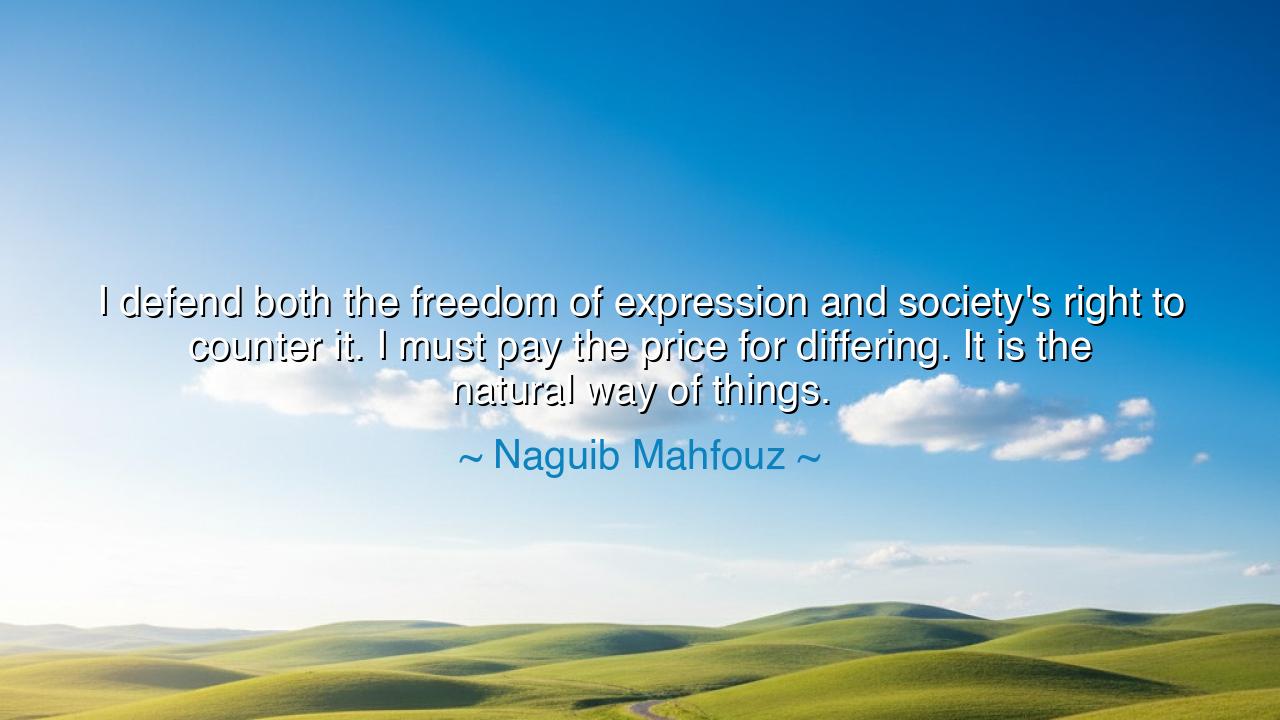
I defend both the freedom of expression and society's right to
I defend both the freedom of expression and society's right to counter it. I must pay the price for differing. It is the natural way of things.






Host: The room was dimly lit, the only light coming from a nearby lamp, casting long, soft shadows across the walls. The air felt calm, as if the evening was inviting quiet reflection. Jack sat at the table, a book in his hands, his eyes tracing the words but clearly lost in thought. Jeeny, who had been reading across from him, noticed his stillness and set down her book, sensing something deeper was on his mind.
Jeeny: “You seem far away. What’s got you thinking so much?”
Jack: “I came across a quote today by Naguib Mahfouz. He said, ‘I defend both the freedom of expression and society’s right to counter it. I must pay the price for differing. It is the natural way of things.’ There’s something so powerful in that. It’s like he’s saying that freedom and the right to disagree are two sides of the same coin, and both come with their own costs. It made me think about the nature of disagreement and how we handle it in society.”
Jeeny: “It really is a profound statement. Mahfouz is acknowledging that freedom of expression is a fundamental right, but with that right comes the inevitable response from others. People will disagree, and those disagreements can have consequences. But rather than being afraid of that, he seems to accept it as part of the natural order—the balance between expressing an opinion and the price you pay for being different.”
Jack: “Exactly. It’s so easy to forget that differing opinions come with consequences. We often see freedom of speech as an absolute right, but Mahfouz’s quote reminds us that to speak out, to challenge the status quo, means that others might respond in ways that challenge or even oppose what we say.”
Jeeny: “And that’s where the real complexity lies. Freedom of expression isn’t just about being able to say whatever you want without consequence. It’s about understanding that people will have different views, and society has the right to respond to those views, even if the response is uncomfortable or critical. The price of expressing something controversial or unpopular is that it invites opposition, but it’s a price worth paying if we believe in the importance of being able to speak freely.”
Jack: “It’s a delicate balance, though, isn’t it? On one hand, you have the freedom to speak, to express your ideas. But on the other, you can’t avoid the fact that your ideas might clash with others. And sometimes those clashes come with personal or social costs. But that doesn’t necessarily make it wrong to voice those opinions—it’s just the way it works.”
Jeeny: “Yes, exactly. It’s not about silencing opposing views, but about understanding that disagreement is part of the process. Freedom of expression allows for the exchange of ideas, but it also opens the door to scrutiny, to differing perspectives. It’s a dialogue, not a monologue. And the willingness to pay the price for that is part of what makes society dynamic and evolving.”
Jack: “So, Mahfouz is really talking about acceptance—accepting both the right to speak and the inevitable responses that come with it. It’s like accepting the responsibility that comes with expressing something that challenges others.”
Jeeny: “Exactly. Expression and counter-expression go hand in hand. They are both necessary for progress. Without the freedom to speak, we don’t have the chance to challenge existing norms. But without the right to counter that expression, we risk creating an environment where only one view is allowed to exist. Both are vital for the healthy functioning of society.”
Jack: “And that’s the hard part. We want to protect the freedom to speak, but we also have to acknowledge that that speech will sometimes ruffle feathers, cause discomfort, or even spark conflict. The key is in managing that conflict in a way that still respects freedom while also allowing for constructive criticism.”
Jeeny: “Yes, and the responsibility doesn’t fall only on the person expressing their ideas—it also falls on those who disagree, who need to engage with the ideas rather than just shutting them down. Disagreement is not the same as censorship. When we engage thoughtfully, we grow as a society. We might not always like what’s said, but that’s the price of living in a world where ideas can be freely exchanged.”
Jack: “It’s almost like a challenge for both sides—those expressing opinions and those countering them. Both must be willing to listen, to understand that freedom of expression and response are interdependent.”
Jeeny: “Exactly. We can’t have one without the other. It’s in the tension between those two that we find true progress, and that’s what makes it worth it—the debate, the disagreement, and the eventual movement toward a deeper understanding.”
Host: The room fell into a thoughtful silence, the weight of Mahfouz’s words settling in. Jack and Jeeny sat in quiet reflection, the balance between freedom and responsibility at the heart of the conversation. In that stillness, the realization dawned that in a society that values freedom of expression, the responsibility to engage thoughtfully with differing views was just as important as the right to speak freely.






AAdministratorAdministrator
Welcome, honored guests. Please leave a comment, we will respond soon